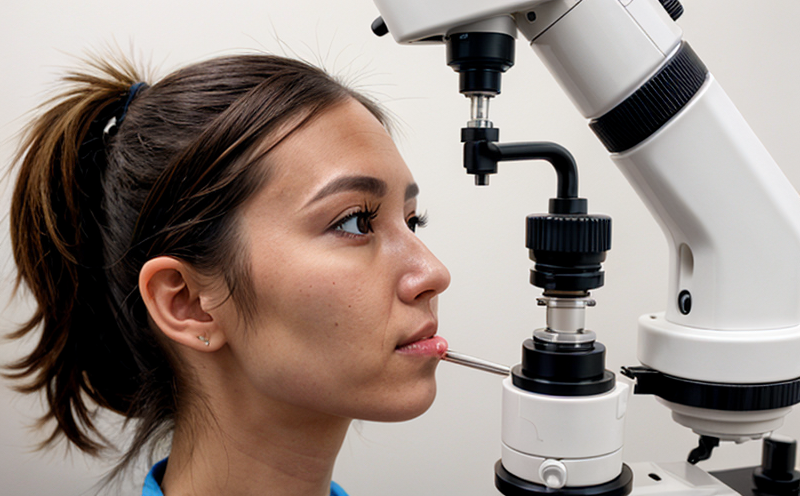ISO 18369-13 Contact Lens Mechanical Stress Testing
The ISO 18369 series addresses the testing of contact lenses and their components. The particular focus of ISO 18369-13:2017 is on mechanical stress testing, which evaluates how contact lenses withstand physical stresses that could be encountered during use. This service ensures that contact lenses are durable and safe for prolonged wear.
This standard has been adopted globally to ensure consistent quality in ophthalmic devices by specifying precise test methods aimed at assessing the mechanical properties of contact lenses under various stress conditions.
The testing process is critical for manufacturers, as it helps them identify potential weaknesses in their products before they reach consumers. Compliance with this standard not only enhances product safety but also contributes to brand reputation and consumer trust.
Our laboratory utilizes advanced equipment and methodologies compliant with ISO 18369-13 standards to ensure accurate testing results. The equipment includes specialized mechanical testers capable of applying controlled forces in different directions, simulating real-world scenarios such as blinking or eye movements.
The process typically involves several steps:
- Selection and preparation of the contact lens specimens according to ISO 18369-13 guidelines.
- Application of mechanical stress using a controlled force application system.
- Observation and measurement of deformation or failure points under specified conditions.
The results are then analyzed for compliance with international standards, providing manufacturers with detailed reports that outline the performance characteristics of their lenses. This information is invaluable for continuous improvement and product enhancement.
| Parameter | Description |
|---|---|
| Force Range | The range of forces applied during testing, typically spanning from 10 to 200 grams. |
| Specimen Preparation | Involves soaking lenses in buffer solution and ensuring uniformity across specimens. |
| Test Duration | The duration of each test cycle, usually set at 1 minute intervals for a total of 5 cycles. |
Understanding the results from this testing is crucial for quality assurance departments. It allows them to pinpoint areas where improvements are needed and ensure that products meet stringent safety requirements before being released to market.
Compliance with ISO 18369-13 helps protect both manufacturers and consumers by ensuring that contact lenses are safe, reliable, and fit well in the eye. This service is essential for maintaining high standards of ocular health and comfort.
Scope and Methodology
The scope of ISO 18369-13 Contact Lens Mechanical Stress Testing encompasses the evaluation of contact lenses' resistance to mechanical stresses. This includes assessing the lens's ability to withstand forces that might be encountered during normal use, such as blinking or rubbing.
- Testing is conducted on both soft and rigid gas-permeable lenses.
- The test involves applying a controlled force to the lens in multiple directions.
- Data collected includes deformation points, failure rates, and overall durability metrics.
The methodology follows strict protocols outlined in ISO 18369-13. These include:
- Preparation of the lenses for testing by soaking them in a buffer solution.
- Placement of the lens on the mechanical stress tester.
- Application of force at specified intervals and recording any changes or failures.
The results are analyzed to determine whether the contact lenses meet the required standards set forth by ISO 18369-13. This ensures that only products meeting these stringent requirements are approved for use.
Our team of experts is dedicated to ensuring that every aspect of this testing process adheres strictly to international guidelines, providing clients with accurate and reliable data they can trust.
Customer Impact and Satisfaction
- Enhanced Safety: By ensuring that contact lenses meet ISO 18369-13 standards, we significantly reduce the risk of eye injuries caused by mechanical stress.
- Better Product Quality: Compliance with this standard helps manufacturers produce more durable and reliable products.
- Informed Decision-Making: Detailed reports provided after testing give stakeholders valuable insights into product performance.
Customer satisfaction is at the heart of our service. We strive to provide accurate, timely results that help clients make informed decisions about their products. Our commitment to quality ensures that you receive reliable data that supports your compliance efforts and enhances your brand reputation.
By partnering with us for ISO 18369-13 Contact Lens Mechanical Stress Testing, customers can rest assured that they are investing in a service that meets the highest international standards. This not only protects consumers but also strengthens your position in the competitive market.
International Acceptance and Recognition
- Global Consistency: Adherence to ISO 18369-13 ensures that contact lens products meet the same rigorous standards worldwide.
- Regulatory Compliance: Many regulatory bodies around the world recognize compliance with this standard as a key factor in approving medical devices.
- Market Access: Products that comply with ISO 18369-13 are more likely to gain market acceptance and broader distribution opportunities.
The widespread adoption of ISO 18369-13 underscores its importance in the global medical device industry. By ensuring compliance, manufacturers can expand their reach into new markets while maintaining consistent quality standards across different regions.
Our laboratory's expertise in this area positions us as a leader in providing reliable testing services that align with international best practices. This not only enhances product safety but also supports your business goals by facilitating easier entry into international markets.





